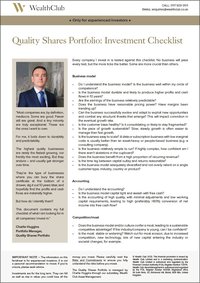Three companies I’m watching – and why they don’t make the cut
Archived article
Archived article: please remember tax and investment rules and circumstances can change over time. This article reflects our views at the time of publication.
I own 15-20 businesses in the Quality Shares Portfolio, but I follow many more.
The best ideas make it onto my watchlist, and I pay close attention to everything they say and do. In effect, I act as if I own them, building up my knowledge, so that if an opportunity presents itself or I need to replace an existing holding, I have a suitably stocked subs bench.
Three of those companies are Costco, Rentokil and Agilent. They all score well on my investment checklist and I rate them highly. But they don’t currently make it into the Quality Shares Portfolio. Here’s why.
Important: The information on individual company shares represents the view of Charlie as portfolio manager but it is not a personal recommendation to buy, sell or hold shares in any company. Experienced investors should form their own considered view or seek advice if unsure. This article is original Wealth Club content.
 Costco Wholesale
Costco Wholesale
Costco ticks pretty much all the boxes I look for.
On the surface, it looks like any other large retailer, selling groceries, fuel, appliances and so on. In practice, there are many aspects of the business that make it stand out, in my opinion.
Unlike most supermarkets, Costco doesn’t operate stores with neatly stocked shelves and tens of thousands of different products. Instead, it owns warehouses and sells around 4,000 items – only one or two brands in each category – sold directly off the pallet and usually in bulk.
The simplicity of Costco’s business model helps keep costs down. It doesn’t need to pay staff to stock shelves, for example. And by purchasing a relatively small number of items for its more than 800 warehouses, Costco also achieves significant volume-based discounts. Add all this up and it means Costco benefits from a significant cost advantage over most of its rivals. The bigger its business grows, the wider that cost advantage becomes.
But there’s more. To shop at Costco, you need to buy a membership. And you can’t buy one of those unless you own a business or work in certain qualifying industries. This means Costco’s members feel they are part of an exclusive club, which makes them very loyal. More importantly, memberships generate recurring income, which accounts for over half of Costco’s profits.
This business model is reinforced by a culture of putting customers first: Costco deliberately keeps its margins down so that it can offer the lowest possible prices to customers. This makes customers even more loyal and Costco even more difficult to compete with.
The results speak for themselves. Over the last decade, Costco’s profits have more than tripled and the shares have returned 469% versus 198% for the US stock market. Past performance is not a guide to the future.
Total return of Costco shares vs. US stock market
Source: Morningstar, 31/03/2013 - 31/03/2023. The graph shows total return for Costco Wholesale Corp and the Legal & General US Index fund (which tracks the US stock market), assuming dividends are reinvested. Performance is shown in US dollars. Past performance is not a guide to the future.
So why isn't Costco in the Quality Shares Portfolio?
It comes down to valuation, combined with unusual circumstances since the pandemic.
The shares trade on almost 40 times earnings, which looks quite rich to me given a weakening economy. In addition, consumers have been on a spending spree since the pandemic, using pent-up savings for household goods rather than things like holidays. I suspect this has benefitted companies like Costco. Should consumers start to tighten their purse strings, Costco’s growth rate and valuation could come under pressure.
Given the quality of Costco’s business, it wouldn’t take much for me to change my mind. And if the valuation came down, I would strongly consider adding Costco to the Quality Shares Portfolio.
Free download: Quality Shares Portfolio investment checklist
The Quality Shares Portfolio, managed by Charlie Huggins, invests in 15-20 global listed companies Charlie believes exceptional for their proven resilience and long-term growth potential.
Why have fewer than 20 companies made it to the portfolio? What types of companies are included? What tests do they need to pass?
 Rentokil Initial
Rentokil Initial
I’ve followed pest control expert Rentokil for almost a decade and I believe it has several attractions.
Rats and cockroaches need dealing with, no matter what’s happening to the economy. Add to this a large slug of recurring revenue from long-term contracts and you have a resilient business, in my view.
Rentokil has also made some shrewd acquisitions and disposals in recent years, selling off lower-quality divisions, and bulking up its pest control division, especially in the US, the world’s largest pest control market. However, its latest move gives me pause for thought.
Rentokil recently bought US pest control rival Terminix for $6.7 billion. This acquisition could be truly transformational. It establishes Rentokil as the leading pest control business in North America. Moreover, it provides scope for substantial cost savings. If all goes to plan, Rentokil should be able to grow margins strongly over the next few years, even if costs like labour and fuel keep rising.
However, big deals always carry risks. Rentokil has a fine track record of integrating acquisitions, but it has never swallowed a deal as large as this. Terminix’s performance prior to the acquisition left a lot to be desired and the need to improve its operations and align its culture with that of Rentokil adds complexity. This process may well take several years and is far from straightforward.
If push came to shove, I would give Rentokil the benefit of the doubt. But I don't need to take that risk in a high-conviction portfolio like the Quality Shares Portfolio. I will watch Rentokil carefully from the sidelines, at least until I get more confidence about how the Terminix integration is progressing.
 Agilent Technologies
Agilent Technologies
Agilent supplies scientific instruments, consumables and services to the life sciences, diagnostics and chemicals industries. The company scores well on my checklist, with market-leading products, recurring sales, high margins, and a strong track record of innovation.
However, I’ve only been tracking Agilent for about six months, whereas I’ve been following most companies in the Quality Shares Portfolio for many years (some for around a decade).
And while I’ve researched Agilent’s track record closely, in my opinion, there is no substitute for following a company’s results in real-time over an extended period. I find the longer I’ve been following a company before investing, the less likely I am to incur negative surprises. I can also gain insights into how a business has evolved, and how management makes decisions.
There’s another reason I’m currently happy to watch Agilent from the sidelines. I already own Danaher in the Quality Shares Portfolio.
Danaher is similar in some ways to Agilent. Both serve life sciences and diagnostics applications, and both have significant exposure to the biotechnology industry. This means I would probably need a compelling reason to own both. And currently, I have more conviction in Danaher’s culture and business model than Agilent’s.
Competition for capital
Just like in any high-performing sports team, competition for places in a portfolio is vital. Having a watchlist brimming with great companies provides that.
For some companies on my watchlist, like Costco, it’s only valuation that gives me pause for thought. For others, like Rentokil and Agilent, I need more time to assess a particular business development or gain conviction. Some companies could slot into the portfolio tomorrow if required.
In a 15-20 stock portfolio like the Quality Shares Portfolio, the bar for new ideas is high. Still, it’s nice to have options. And if I do lose conviction in any of my holdings, it means I should have a ready replacement.
Apply online now: Quality Shares Portfolio, managed by Charlie Huggins
The Quality Shares Portfolio, managed by Charlie Huggins and exclusively available through Wealth Club, is a portfolio specifically designed for people who are genuinely interested in investing.
It’s a portfolio of 15-20 global businesses chosen for their resilience, financial strength and pricing power.
It is profoundly different from any other investment you might hold in two key respects. The first is the level of information, insight and transparency it provides (you can see an example here). The second is in the investing approach itself.
You can invest in the Quality Shares Portfolio online, if you’re a high net worth or sophisticated investor. The minimum investment is £10,000; you can invest in an ISA, SIPP or in a General Investment Account, subscribing new money or transferring existing investments.
Liked this article? Register to receive the next one straight into your inbox.
Wealth Club aims to make it easier for experienced investors to find information on – and apply for – investments. You should base your investment decision on the offer documents and ensure you have read and fully understand them before investing. The information on this webpage is a marketing communication. It is not advice or a personal or research recommendation to buy any of the investments mentioned, nor does it include any opinion as to the present or future value or price of these investments. It does not satisfy legal requirements promoting investment research independence and is thus not subject to prohibitions on dealing ahead of its dissemination.

